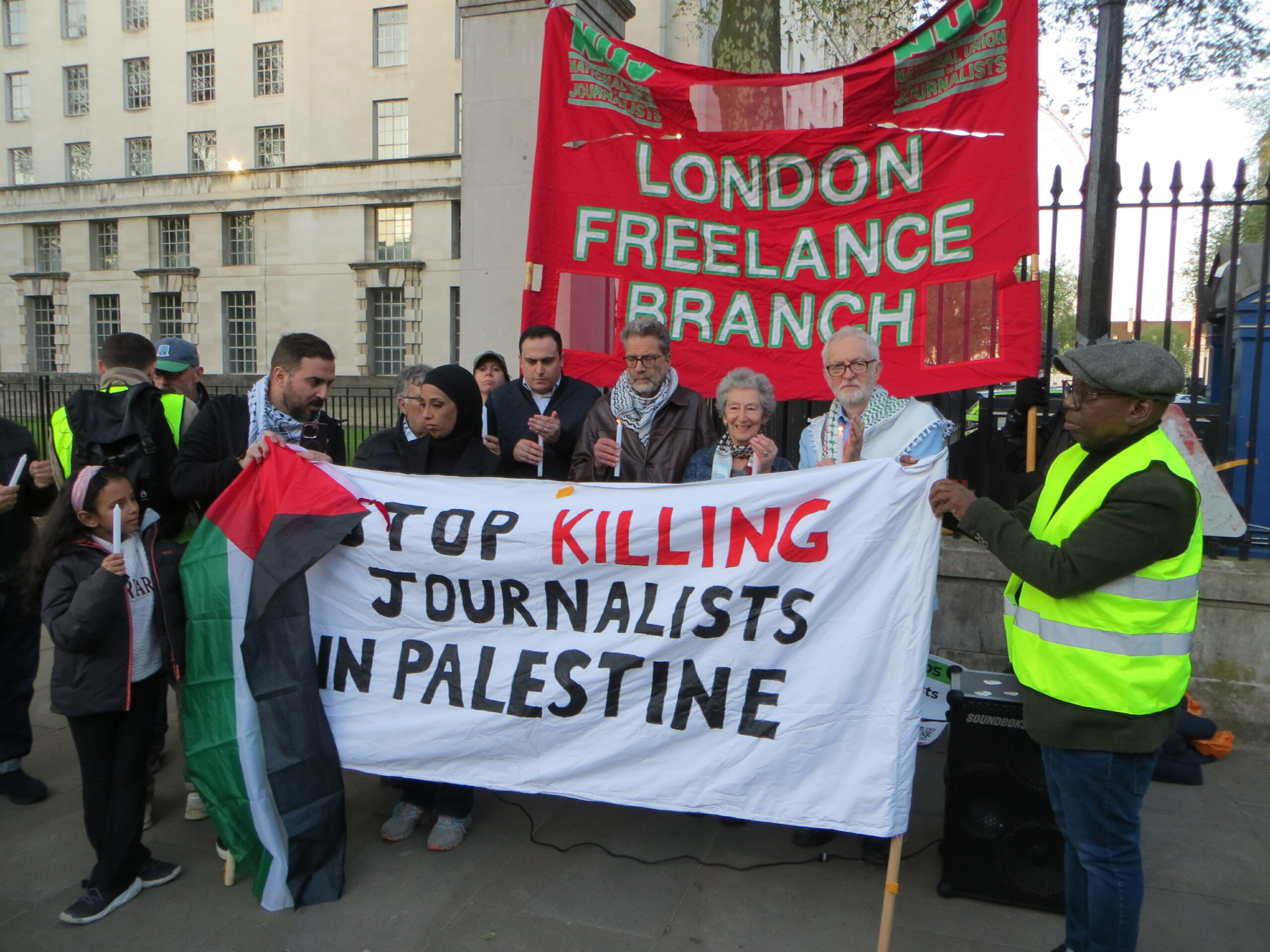Ireland: Dublin vigil for slain journalists
Members of the NUJ gathered on the steps of the Hugh Lane Galley in Dublin’s Parnell Square on Monday 29 April to remember the journalists killed in the war in Gaza.
The gallery steps overlook the capital city’s Garden of Remembrance and poignantly had previously been the venue for a vigil held to mark the killing of journalist Lyra McKee.
NUJ vice presidents Gerry Curran and Fran McNulty, Cearbhaill O’Siochain chair of the union’s Irish Executive Council (IEC), press ombudsman Susan McKay and Ian McGuinness, Irish organiser were among those who read from the list of the 109 journalists featured on the IFJ list of slain journalists.
A minute’s silence was observed following the reading of the list. In welcoming the attendance, which included a group of visiting Czech journalists and colleague trade unionists, Séamus Dooley renewed calls for a permanent ceasefire and said the NUJ remains gravely concerned at the treatment of journalists by the Israeli government.
The event marked International Workers’ Memorial Day and focussed on the killing of journalists in Gaza. Last year the EC hosted a similar event at the Garden of Remembrance to remember all journalists killed in the line of duty in the period since the last Irish Delegate Conference.
Séamus Dooley said the journalists killed were slain because of their profession. In remembering those who have died we should also remember those injured and all who had lost loved ones.
It is vital, he said, that journalists should be free to enter Gaza and to report on the war. The terrible horror which has unfolded in Gaza was a story which must be covered.
USA: CWPR on 28 April
Workers Memorial Day takes place on 28 April. People around the world will honor the thousands killed each year on the job and the millions more who suffer serious occupational injuries and illnesses. The number of workplace fatalities and injuries remains unacceptably high: in construction alone, approximately 1,000 workers die on job sites annually.
Each year, April 28th offers the opportunity for us to remember those who have died and to strengthen our commitment to make sure every worker comes home safely every day. Fulfilling that commitment takes the dedication of people across the industry: owners, contractors, managers, government officials, unions, workers, and many others.
Improving the safety and health of construction workers must take many forms and respond to many hazards. This year we encourage everyone to focus on addressing:
- Falls. One in three work-related deaths in construction is caused by a fall. The National Campaign to Prevent Falls in Construction brings together people from across the industry to raise awareness of this hazard and to show how to prevent these incidents. Participate in next week’s National Safety Stand-Down to Prevent Falls in Construction as part of making a year-round commitment to eliminating this hazard.
- Mental Health. Mental health issues — especially opioid dependency and suicide – continue to affect construction workers at much higher rates than the average U.S. worker. CPWR’s resources, which include Hazard Alert Cards, Toolbox Talks, and training programs, all support prevention. Also, watch for the opportunity to sign up to receive a new newsletter highlighting mental health research and effective resources.
- truck-by Incidents. The just-completed National Stand-Down to Prevent Struck-by Incidents raised awareness of these hazards, the second leading cause of death and the leading cause of nonfatal injuries among construction workers. Listen to the Stand-Down webinar on developing Internal Traffic Control Plans and check out other CPWR materials that address hazards such as dropped objects, heavy equipment, lift zone safety, and work zone safety.
USA: BlueGreen Alliance | New Report Highlights Worker Safety Actions Under Trump, Biden Administrations
“Workers’ Memorial Day honors the workers who didn’t come home at the end of their shift,” said BlueGreen Alliance Executive Director Jason Walsh. “It’s also the day we can commit ourselves to a future where every worker is able to say goodbye to their families before their shift with the safe assumption that they will be returning home healthy at the end of the day. We should expect our leaders to prioritize that.”
The new report builds on a September 2020 BlueGreen Alliance report—Misled: The Impact of the Trump Administration’s Agenda on Working Families and the Environment—which provided an analysis of a range of policy actions made by the Trump administration. In the new report the organization revisits those policy actions related to worker health and safety and sets them alongside actions from the Biden administration.
Palestine/Britain: 28 April demand to stop killing journalists in Palestine
Members of the NUJ London Freelance Branch were joined by supporters and campaigners in Westminster opposite Downing Street to mark Workers Memorial day calling for an end to the killing of journalists in Gaza and the middle east. A good crowd heard from Gazan journalists, Palestinians and their supporters.
They were joined by Owen Jones and Jeremy Corbyn MP. The names of those journalists killed – that NUJ is aware of – was read out, and it took sadly considerable time to complete (listed in link below).
NUJ LFB: Remembering journalists killed in the Israel-Gaza war
All pictures copyright NUJ LFB member and Waltham Forest Trades Council delegate Mick Holder.
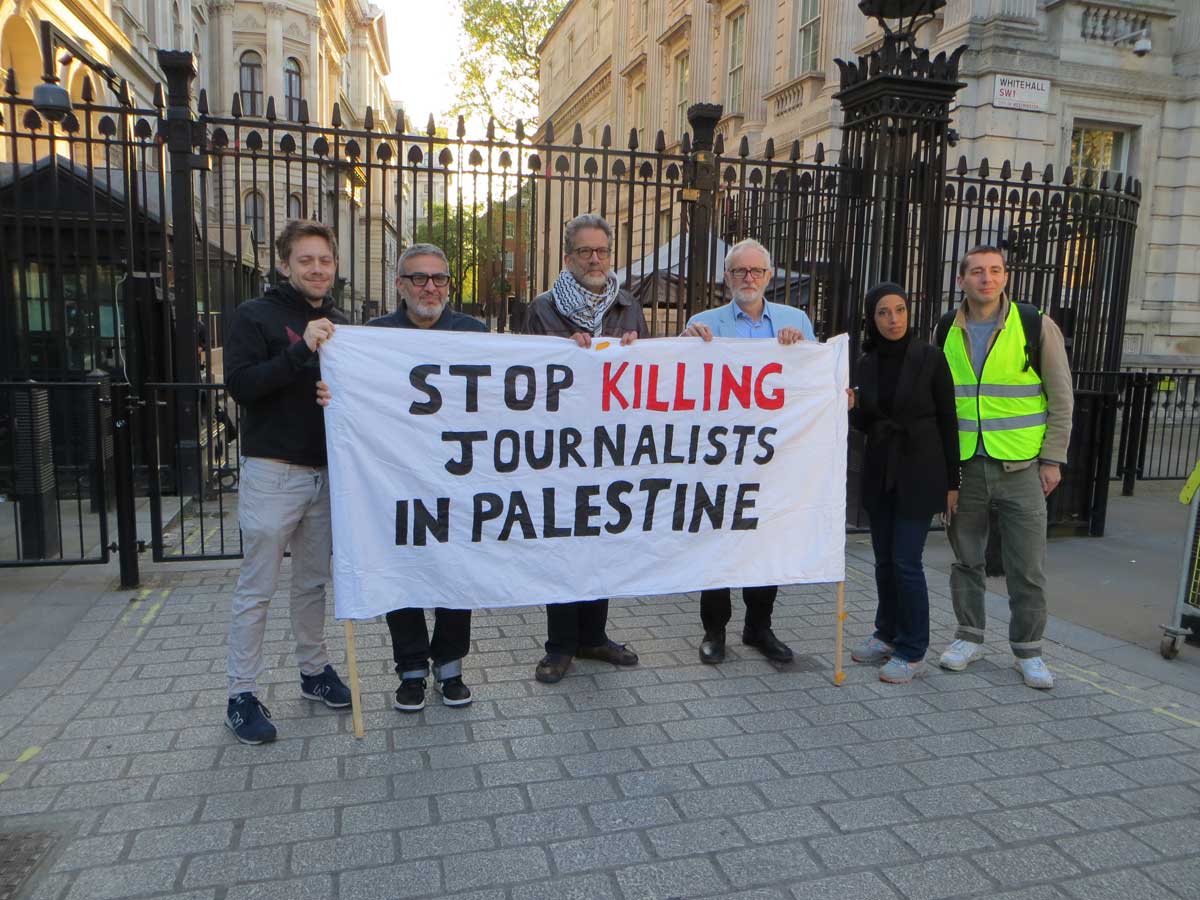 Media workers and health workers in other parts of the UK, including Sheffield, similarly marked 28 April by protesting the Israeli army’s killing and injuring of workers in Gaza and the Occupied West Bank during the current conflict.
Media workers and health workers in other parts of the UK, including Sheffield, similarly marked 28 April by protesting the Israeli army’s killing and injuring of workers in Gaza and the Occupied West Bank during the current conflict.
Ireland: NUJ members rally for International Workers Memorial Day
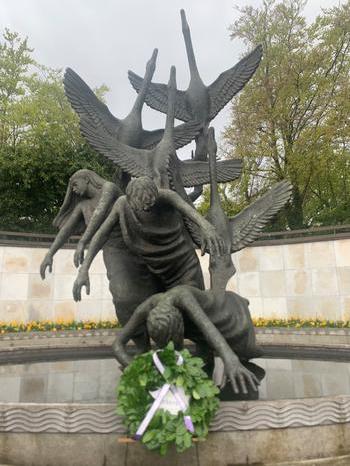
Irish representatives gather at Irish Congress of Trade Unions memorial
To mark International Workers Memorial Day, the NUJ has organised and attended a number of events remembering those who have died carrying out their work and acknowledging their loss.
At the weekend the union held a vigil in Dublin and representatives also took part in a memorial today at the city’s Garden of Remembrance.
Séamus Dooley, NUJ Irish Secretary and Ian McGuinness, NUJ Irish Organiser (and member of the Irish Congress of Trade Unions Health and Safety committee) heard ICTU General Secretary Owen Reidy give a speech sending, “solidarity to workers internationally” and calling “for safe work at home and across the world.”
“Our event today is the National Commemoration for WMD; but it is not the only event, trade unions and workplaces will be organising events and observing a minute’s silence across the country and I know that the NUJ, among other unions, organised a vigil in Dublin yesterday.”
Reidy added that in Ireland, “tragically this year has seen a rise in workplace fatalities. When I was at this ceremony last year, 27 people lost their lives in 2022, the lowest on record. Even one death is one death too many but it is unacceptable that the number of people who lost their lives in 2023 stood at 43.
“No one should have to put their lives at risk to earn a living.”
Other NUJ events on Monday include London Freelance Branch organising a rally at 6.30pm on Whitehall opposite Downing Street with speakers to honour colleagues killed in Gaza and the NUJ holding an event in Dublin at 6pm remembering all the journalists killed in the line of duty in Isreal/Palestine and reading their names out on the steps of the Hugh Lane Gallery, Parnell Square.
Marking IWMD, Michelle Stanistreet, NUJ general secretary, said: “No story is worth a person’s life, but all too often journalists find themselves literally in the line of fire when carrying out their work. They endure dangerous conditions to cover wars and conflicts, they shine a light into places political despots and criminal gangs prefer kept dark and expose wrongdoings and corruption across the globe.
“The death toll, now more than 100 in Gaza, is all the more shocking because we believe journalists are being directly targeted by the Israeli Defence Forces. That is why we are calling for an immediate investigation by the International Criminal Court to ensure all incidents of the targeting of journalists constituting war crimes under international law are properly investigated.
“On IWMD we will be mourning the deaths of our journalist colleagues in Palestine and extending sympathy to their families. We will continue to work with International Federation of Journalists and the Palestinian Journalists’ Syndicate to provide protection and provisions for the press working in unimaginable situations and suffering enormous privations. That’s why we thank members, chapels and branches for their generosity so far, but ask for further donations to the IFJ safety fund.
“We again call for the release of all hostages and for both sides to agree to a permanent ceasefire to ensure attacks on journalists and all civilians comes to an end.
“As the IFJ’s list of media workers killed grows by the week, we continue to argue with the UN for an international, legally binding convention to protect the safety and independence of journalists and to recognise that media workers face greater risks when compared to other civilians.
“On the home front, workers in the UK and Ireland are sustaining fatal injuries while doing their jobs. That is why we are working with the Trade Union Congress and the Irish Congress of Trade Unions to fight for workers’ rights and safety, and lobby for greater protections while supporting the vital role of unions’ health and safety reps on the ground.”
Others who have lost their lives while doing their jobs this year include: Pakistani journalist, Sagheer Ahmed Laar, was killed on 14 March after unidentified men opened fire on him outside a pharmacy in Punjab; Abdikarin Ahmed Bulhan, a reporter for Somali National Television (SNTV), was killed on 13 March in the Abudwak district of the Galguduud region in central Somalia when an armed security guard shot and fatally wounded him at his workplace; Western News journalist Myat Thu Tan was shot dead by military personnel on 31 January along with seven other political prisoners jailed by Myanmar’s ruling junta.
Asia Pacific/Philippines: On April 28 Fishworkers Solidarity remembers commercial tuna fishing workers lost at sea
On International Workers’ Memorial Day, April 28, the IUF-affiliated Fishworkers Solidarity, a member organization of SENTRO, remembered the commercial tuna fishing vessel workers who died or who were “lost” at sea and remain unaccounted for.
Among those remembered on April 28, were workers on tuna fishing vessels who died at sea but whose death was not considered a workplace death. This includes Perfect Aldo who died onboard on January 10, 2020, Arnel Abada who died at sea from pneumonia on June 12, 2021, and Noneto Romero who died onboard from cardiac arrest on November 5, 2022.
Also remembered are those that the commercial tuna industry and authorities simply declare as “missing” at sea. This includes Gerir Rulete, missing since September 3, 2014. After a decade his family still cannot find peace and his death has not been recognized as work-related.
Warren Poncardas has been “missing” since August 21, 2003. After 21 years his family too cannot find peace. This is another death while working that is not officially work-related.
The families of Roger Maglasang, Carlos Dejillo, Marvin Villaroya, Ricky Longgarit, and Roy Maglasang were all told that their husbands, fathers, brothers were missing at sea on August 24, 2003. Twenty-one years later, they remain unable to bury their loved ones; unable to declare them dead. As a result, their families are denied the certainty – the truth – that they died while working at sea. They are also denied the insurance they are entitled to for the work-related deaths of their loved ones.
Along with Gerir Rulete and Warren Poncardas, Roger Maglasang, Carlos Dejillo, Marvin Villaroya, Ricky Longgarit, and Roy Maglasangare are among the Unknown Workers killed and forgotten by an irresponsible and reckless commercial tuna industry.
On April 28, Fishworkers Solidarity called for urgent action by the government, employers and the commercial fishing industry to take responsibility for the health and safety of fishworkers throughout the tuna industry and to save lives.
The full text of the statement is below:
Fishworkers’ Solidarity Stands United on International Workers’ Memorial Day: Remember the Dead, Fight for the Living
International Workers’ Memorial Day, 28 April 2024
Fishworkers’ Solidarity reaffirms its commitment to honoring the memories of those who have lost their lives in the pursuit of their livelihoods, while steadfastly advocating for the safety and well-being of all workers in the fishing industry.
This solemn day serves as a poignant reminder of the sacrifices made by countless individuals who have tragically lost their lives due to occupational hazards and unsafe working conditions. From treacherous waters to inadequate safety measures, fishworkers often face perilous situations in their daily endeavors to provide sustenance for communities worldwide.
Today we remember the countless number of fishworkers who were lost out in the sea and remain “missing”. This year alone, we have identified at least 8 fishworkers who are considered “missing”, and that’s just for General Santos and the Saranggani Bay area alone. One wonders, do our government even keep track of these things?
We stand in solidarity with those who continue to endure hazardous working environments and demand accountability from stakeholders responsible for ensuring workplace safety. With the guiding principle of “Remember the Dead, Fight for the Living,” Fishworkers’ Solidarity underscores the urgent need for comprehensive reforms to prioritize the safety and rights of fishworkers everywhere.
This International Workers’ Memorial Day, Fishworkers’ Solidarity calls upon governments, employers, and industry leaders to:
Fully realize the our aspiration for “responsible fisheries and sustainable development” by enhancing the full participation of fishworkers in the whole decision-making process related to fishery resources.
Stop all proposals to amend the Fisheries Code and instead focus all government resources, including that of the non-government sector, on the a whole-of-government, full and effective implementation of the present provisions of the amended Fisheries Code to address illegal, unreported and unregulated fishing including the full implementation of the vessel monitoring system, with data provided to local governments and enforcement agencies.
Enhance safety regulations and enforce stringent measures to prevent accidents and fatalities in the fishing industry.
Provide adequate training, resources, and protective gear to empower fishworkers to carry out their duties safely.
Foster collaborative initiatives between stakeholders to address systemic issues and promote a culture of safety and respect within the industry.
Recognize the invaluable contributions of fishworkers to global food security and uphold their fundamental rights to fair wages, decent working conditions, and social protection.
Together, let us honor the memory of those we have lost by advocating for meaningful change and ensuring that no worker faces unnecessary risks in the pursuit of their livelihood.
Fishworkers’ Solidarity remains unwavering in our commitment to safeguarding the lives and dignity of all fishworkers, today and always.
Through collective action and advocacy efforts, we strive to address the challenges facing fishworkers and promote sustainable practices in the fishing industry. Join us in our mission to create a safer and more equitable future for all fishworkers.
Britain: TUC 28 April video message
“On International Workers’ Memorial Day, we remember every life lost to unsafe work and commit to fighting for the health and safety of every worker.”
On International Workers’ Memorial Day, we remember every life lost to unsafe work and commit to fighting for the health and safety of every worker.#IWMD pic.twitter.com/JXZA2gUfZ1
— Trades Union Congress (@The_TUC) April 28, 2024
Philippines: Workplace safety group urges labor department action to protect workers from extreme heat – IOHSAD
“On this International Workers’ Memorial Day, amid record high temperatures, the Institute for Occupational Health and Safety Development (IOHSAD), a workplace safety NGO, is calling upon the Labor Department to take decisive action to protect workers’ health and safety in the face of intensifying heat conditions.” more
Global: Día internacional de la memoria de los trabajadores: los sindicatos en primera línea frente a los riesgos climáticos – UNI
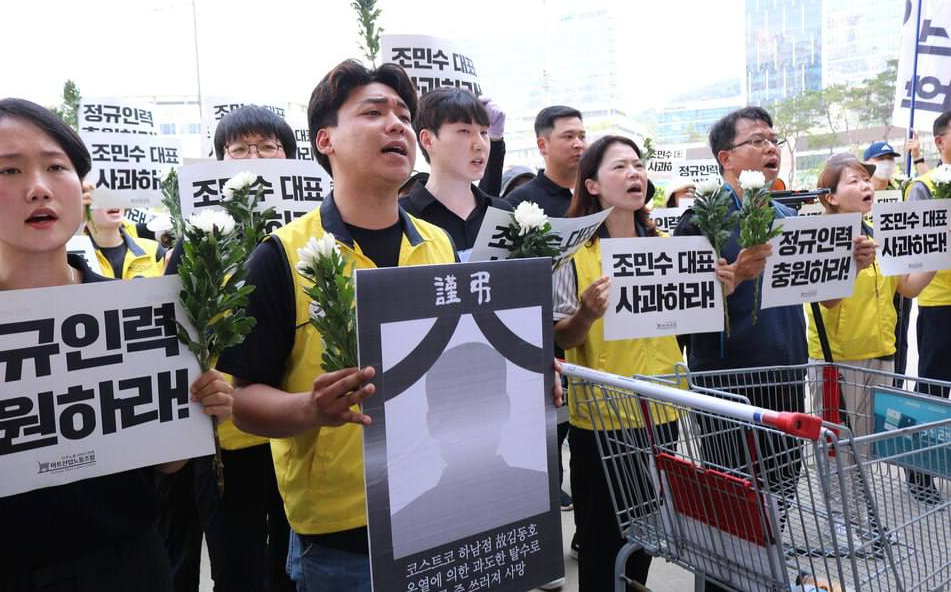
Este Día Internacional de la Memoria de los Trabajadores28 de abril, UNI Global Union se une a los sindicatos de todo el mundo para exigir medidas urgentes contra la crisis climática.
A medida que suben las temperaturas, también “Riesgos climáticos para los trabajadoresel lema de la CSI para este día de recuerdo y compromiso.
La emergencia climática mundial ha creado nuevos peligros y agravado los ya existentes para los trabajadores. Como en tantas otras cuestiones de salud y seguridad en el trabajo, los sindicatos y la negociación colectiva son soluciones necesarias.
“La crisis climática está matando a los trabajadores, y los sindicatos están en primera línea para hacer que los empleos – y las comunidades – sean más seguros”, dijo la Secretaria General de UNI Christy Hoffman. “Los sindicatos contraatacan a los empleadores que intensifican cruelmente los objetivos incluso con un calor abrasador. Aseguramos las pausas obligatorias, los equipos vitales y las protecciones necesarias que salvan vidas. Abogamos por una transición justa hacia una economía sostenible, que no deje a ningún trabajador atrás.”
A nuevo informe de la OIT concluye que un número “asombroso” de trabajadores (2.400 millones, es decir, más del 70% de la población activa mundial) se enfrentará a riesgos para la salud relacionados con el cambio climático, como el estrés térmico, el cáncer, las enfermedades cardiovasculares, las enfermedades respiratorias, las disfunciones renales y las afecciones mentales.
Aunque con razón se presta mucha atención a sectores como la construcción, la minería y la agricultura, los trabajadores de los servicios también se enfrentan a estos riesgos.
Este fin de semana, la UNI afiliará al Federación Coreana de Sindicatos de Trabajadores de Servicios (KFSU) hará huelga en Costco para protestar por las condiciones laborales injustas e inseguras en los establecimientos de la multinacional estadounidense en ese país. La huelga es la segunda desde que en junio de 2023 muriera un empleado en el trabajo tras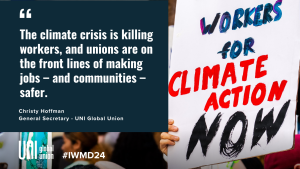 exposición al calor extremo.
exposición al calor extremo.
El fallecido, un hombre de 29 años sin afecciones crónicas, trabajaba como cajero en la caja. En el momento de su muerte, se encargaba de los aparcamientos, los carros y la gestión del aparcamiento.
Murió durante una ola de calor, y el sindicato afirma que la empresa no proporcionó instalaciones de aire acondicionado ni termómetros independientes para los trabajadores del aparcamiento. Además, la empresa obligaba a los empleados a permanecer de pie durante todo el horario laboral, sin asientos ni zonas de descanso disponibles.
El presidente de la KFSU, Kang Kyu-Hyok, declaró entonces: “Condenamos enérgicamente a Costco Korea por no contratar la mano de obra necesaria, exprimir a los trabajadores para reducir costes y no proporcionar a tiempo lo esencial para la vida y la seguridad de los trabajadores. Costco debe tomar medidas para evitar que [este tipo de tragedia] vuelva a ocurrir”.
Las afiliadas de comercio de la región de Asia y el Pacífico de UNI aprobaron una resolución en apoyo de la huelga del 27 de abril en la que se pedía a a Costco Corea y al Director General Cho Min-Soo que acepten la responsabilidad “por la muerte evitable de su trabajador como accidente laboral” y a la empresa que negocie las condiciones en la tienda.
Los trabajadores de Amazon de todo el mundo tienen reivindicaciones similares. Por ejemplo, uno de los almacenes de la empresa en el sur de California alcanzó temperaturas de 106F (41C) el verano pasado, y los empleados tuvieron que trabajar a velocidades brutales para cumplir sus cuotas de producción.En el Reino Unido, el sindicato GMB ha hecho de la seguridad uno de los pilares de su campaña de sindicalización en Amazon, y ahora los trabajadores se encuentran en una lucha histórica por el reconocimiento sindical. lucha histórica por el reconocimiento sindical.
Pero no se trata sólo de los trabajadores del comercio. Los riesgos climáticos afectan a todos los sectores de UNI.
La OIT identifica a los deportistas como un grupo muy expuesto a temperaturas extremas. Por ello, sindicatos de jugadores como FIFPRO se están organizando para conseguir una mayor protección contra los trastornos inducidos por el estrés térmico.
En Brasil, el sindicato gráfico y de embalaje SINDICRIP ayudó a los trabajadores de WestRock a superar el aumento de las temperaturas organizándose en torno a la mejora del acceso al agua en el trabajo. Mediante una muestra de interés colectivo, los trabajadores consiguieron que la empresa se sentara a la mesa para conseguir más dispensadores de agua.
Los vigilantes de seguridad trabajan a menudo en el exterior y se enfrentan a las inclemencias del tiempo, como el calor hirviente, el frío extremo y una mayor exposición a los rayos UV cancerígenos. Los sindicatos están tomando medidas. Con el apoyo de UNI, el Sindicato de Trabajadores de Seguridad Gujarati de la India hizo campaña y consiguió agua potable, un segundo uniforme y refugio para ayudar a combatir temperaturas que alcanzan los 113F (45C). UNI también apoya a nuestra afiliada en Nepal, el Sindicato deTrabajadoresde Seguridad de Nepalpara conseguir abrigos de invierno adecuados para trabajar en el frío glacial.
Los empleados de correos se enfrentan a las consecuencias catastróficas del cambio climático. De hecho, UNI Correos y Logística identifica la crisis climática como uno de los mayores riesgos para los trabajadores postales.
Además de los peligros directos de trabajar en condiciones meteorológicas extremas, los gobiernos suelen utilizar a los trabajadores postales y la infraestructura postal en épocas de catástrofe para apoyar a las personas afectadas y ayudar a las organizaciones. La inundaciones de 2022 en Pakistán es un buen ejemplo.
Dado el daño que el clima extremo causa a los trabajadores, no es de extrañar que los sindicatos postales se hagan oír cada vez más no sólo en materia de protección del lugar de trabajo, sino también de política climática. UNI Correos y Logística ha propuesto un nuevo acuerdo ecológico para correos, y afiliadas como CUPW en Canadá están tomando la iniciativa de presionar para que el correo sea sostenible.
El Secretario General de la CSI, Luc Triangle declaró: “La crisis climática ya no es una amenaza lejana; es un peligro presente para los trabajadores de todo el mundo. Es imperativo que exijamos políticas y prácticas sólidas para proteger a nuestros trabajadores de los peligrosos impactos del cambio climático. Nuestro llamamiento a la acción es claro: debemos integrar las evaluaciones del riesgo climático y la preparación para emergencias en nuestras normas de seguridad y salud en el trabajo.”

